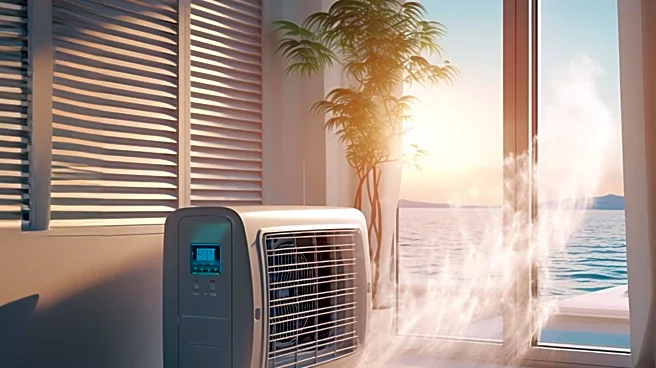What's Happening?
Air conditioning systems, while essential for comfort, can pose health risks if not properly maintained. According to a microbiologist, malfunctioning or poorly maintained AC units can become breeding grounds for infectious microbes, leading to airborne infections such as the common cold and pneumonia. 'Sick building syndrome' is a term used to describe symptoms like headaches, dizziness, and respiratory issues that can develop from prolonged exposure to air-conditioned environments. Studies have shown that individuals working in air-conditioned offices report higher incidences of these symptoms compared to those in non-AC environments. Additionally, bacterial pathogens like Legionella pneumophila, responsible for Legionnaires' disease, can thrive in water-rich environments such as air conditioning systems, posing serious health risks.
Why It's Important?
The implications of these findings are significant for public health, particularly in office settings and communal spaces like hospitals and hotels. The potential for air conditioning systems to spread infections highlights the need for regular maintenance and proper functioning of these units to prevent health hazards. Vulnerable populations, such as immunocompromised individuals, are at greater risk, emphasizing the importance of stringent hygiene practices in healthcare facilities. The economic impact is also notable, as increased absenteeism due to illness can affect productivity and operational efficiency in workplaces reliant on air conditioning.
What's Next?
To mitigate these risks, stakeholders such as building managers and healthcare administrators may need to implement more rigorous maintenance schedules for air conditioning systems. Regular cleaning and sanitization can help reduce the spread of infectious microbes. Additionally, further research into the design of air conditioning systems could lead to innovations that minimize health risks. Public awareness campaigns might be necessary to educate individuals on the importance of maintaining indoor air quality and recognizing symptoms of sick building syndrome.
Beyond the Headlines
The ethical dimension of this issue involves ensuring safe working conditions for employees and patients in environments reliant on air conditioning. There is also a cultural aspect, as societal reliance on air conditioning for comfort may need to be balanced with health considerations. Long-term shifts could include increased demand for air purification technologies and a reevaluation of building design standards to prioritize health.








